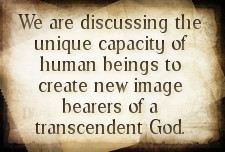
Those of you who are regular readers may have wondered where I’ve been recently. If my estimate is correct, this is the longest I’ve been away since I first started blogging over two years ago. The reason is simple: life, over the course of these last three weeks, has been epic in every sense of the word. It has read like something Solomon himself could have penned. It’s literally been
A time to plant, and a time to pluck up what is planted;
A time to kill, and a time to heal;
A time to break down, and a time to build up;
A time to mourn and a time to dance…(Eccles. 3:2-4)
In the last three weeks, we’ve seen babies, death, weddings, work deadlines, gardening (which, we all know, waits for no man), family vacation, and now once again, we’re counting off the days until school starts as the wheels of time have continued to turn, turn, turn. And more than ever, I feel my immortality creeping in. Yes, you read that right, my immortality.
Often, when we’re caught in a busy season of life, when the days blur and blend into weeks before we even realize it, our first impulse is clutch at the passing moments and try to harvest every drop of meaning from them. We scamper and scurry like little field mice desperate to collect our winter stores before it is too late. Rush, rush, hurry, hurry. Winter is coming. Life is passing you by.






Discussion